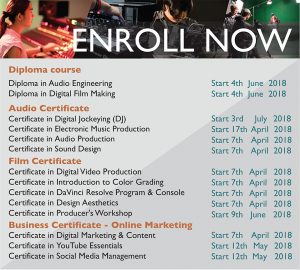The Audio Engineering Diploma Program offers students the opportunity to study all aspects of modern audio engineering. A unique combination of theoretical study, practical classes and hands-on studio time gives students a thorough knowledge of a broad range of topics related to audio production and how the music industry works. Students will have access to industry standard professional hardware and software, including large format inline consoles, control surface, hardware and software processors, and software such as ProTools and Ableton. The program is considered equivalent to the first year of the BA/BSc (Honour) Degree program. Successful completion of the Diploma gives graduates the possibility to continue their studies towards a BA/BSc (Honour) in Audio Production.
Diploma in Audio Engineering
one-year intensive Crème Academy legacy diploma
Prerequisites
- Participants should be at least 17 years of age upon commencement of the course.
- Minimum of high school certificate or equivalent.
- No skill prerequisites are required to participate in this program.
- Basic knowledge of the English language and computer skills needed.
- Full-time study required.
Course Content
11 months, 166 lessons * 3 hours/lesson
Basic Sound Theory
Focuses on the basic principles of sound and acoustics. Topics include the fundamentals of how sound behaves, the human ear and hearing, an introduction to acoustics, frequency analysis, and ear-training.
Studio Equipment and Signal Processing
This module examines the key components generally found in a professional recording studio. Topics include audio mixing consoles, effects processing, analog and digital signal processors, noise reduction, equalization, audio connections and signal flow.
Audio Electronics
Knowledge of the fundamentals of electronics theory is essential to understanding audio and recording technology. Topics covered include basic electronics theory, common components, reading equipment specifications, decibels, standard operating levels, equipment testing, cables & connectors, as well as a focus on occupational health and safety.
Digital Audio Technology
Used throughout the professional audio industry, digital technology has changed the traditional role of the professional audio engineer. Engineers today must be highly computer literate and familiar with a range of software. Topics include digital recording studios, digital audio theory, computer & software operation, file formats, MIDI, advanced ProTools operation, digital hardware, software plugins, synchronization, and understanding both the advantages & disadvantages of digital technology.
Professional Recording Studios
This module focuses on using the studio for an entire production from tracking to mix-down to mastering. Main topics: advanced signal flow, mix-down, audio console operation, session planning, microphone techniques, working with a producer, recording various genres of music and session workflow.
Advanced Studio Studies
Focusing on advanced studio recording & mixing techniques, this module aims to prepare students for the workplace. Topics such as production techniques, arranging, creating stereo and surround masters, studio etiquette, and advanced mixing techniques will be covered.
Acoustics
This module focuses on basic acoustic principles and studio design from a practical perspective. Main topics: acoustics theory, studio monitoring, psychoacoustics, studio construction fundamentals, room evaluation, isolation, live applications of acoustics, and studio design.
Music Theory
Music is the ‘language’ of audio engineers and a firm grasp is essential to being successful in a studio environment. This module examines Western music history, genre development, notation, rhythm, scales, harmony, chords, as well as introduction-level copyright and music business legal issues.
Audio Post-Production
Many audio engineers are employed in studios and post-production houses working with sound for motion picture and video production. This module covers a number of key topics, including sound for film, synchronization, on-line and off-line sound editing, Foley techniques, additional dialogue replacement (ADR), basic sound design, video signal flow, and basic video editing.
Live Sound Reinforcement
Live performance and events comprise another niche within the industry where many audio engineers are employed. This module focuses on live sound system design, installation and operation, including loudspeaker placement and design, live sound system tuning and fault-finding, concert FOH systems, monitoring, live recording, and broadcast feeds.
Mastering and Remixing
This is usually the final stage in the production process and this module examines the critical link between recording and final CD manufacturing, with the goal of maximum impact on the listener. Topics include advanced digital theory, mastering formats, mastering signal processing techniques, duplication processes, how CD’s work, and mastering for audio and remix techniques.
Interested in our courses?
Make an enquiry through our online form and our staff will contact you shortly.
